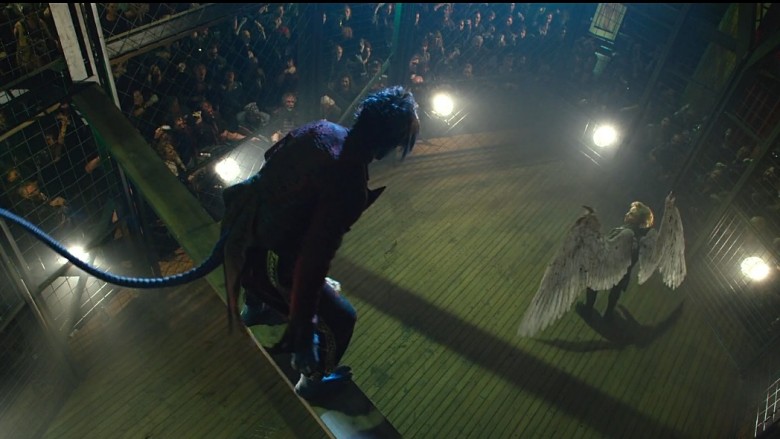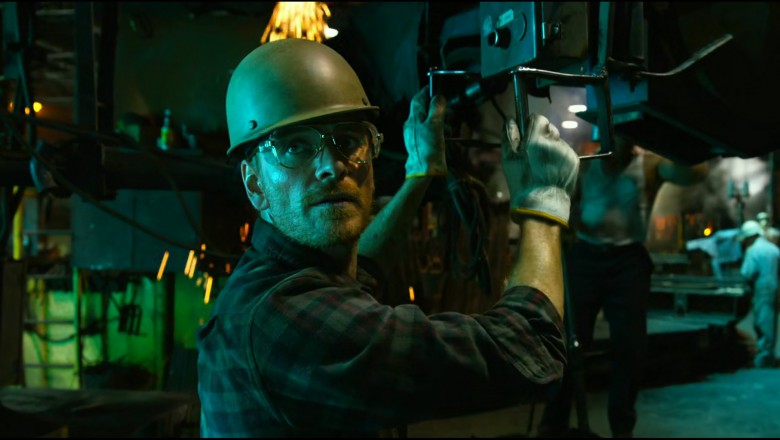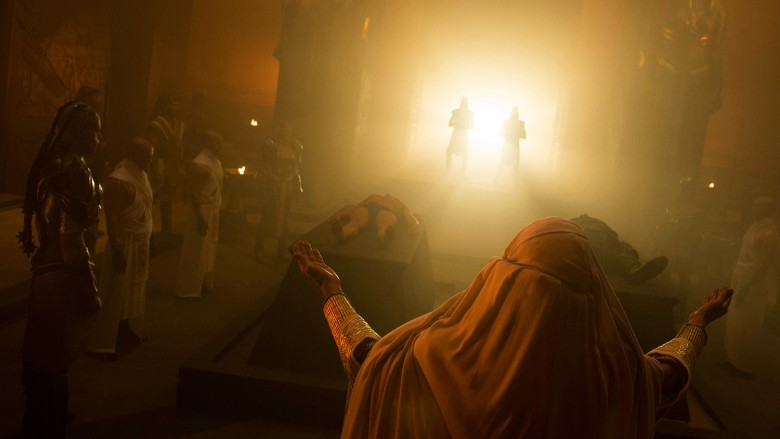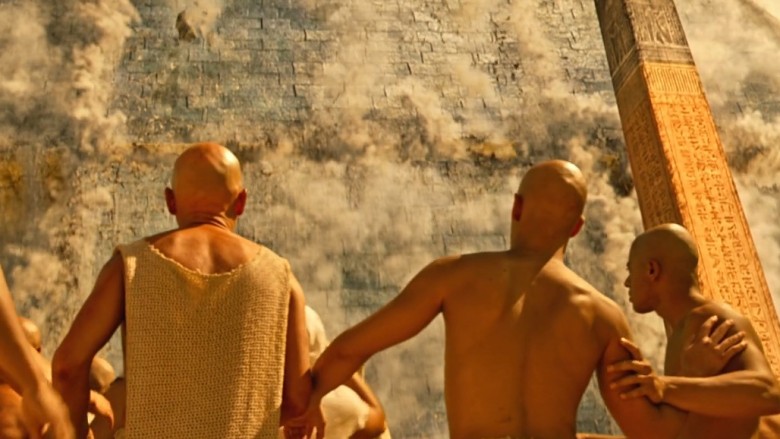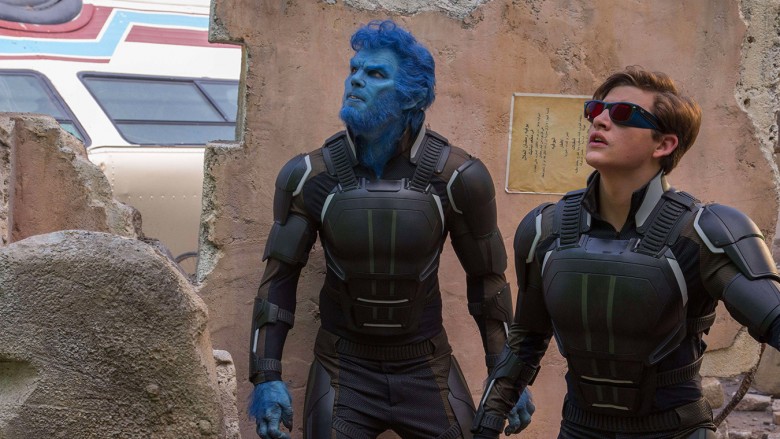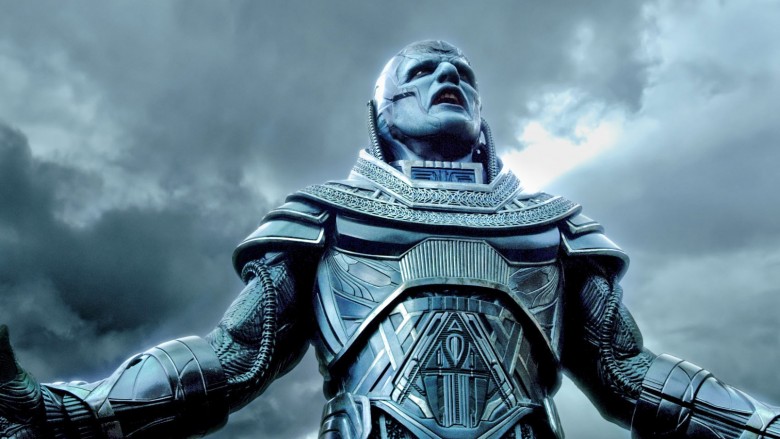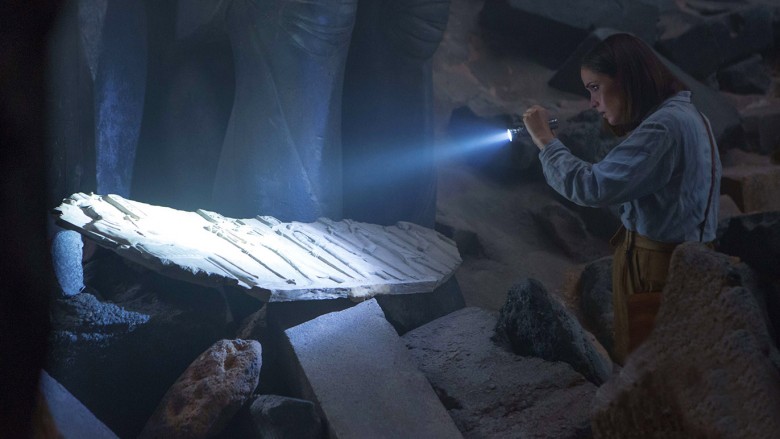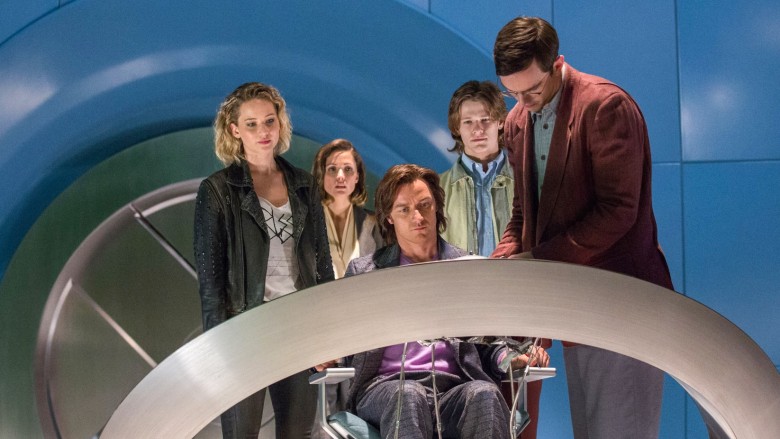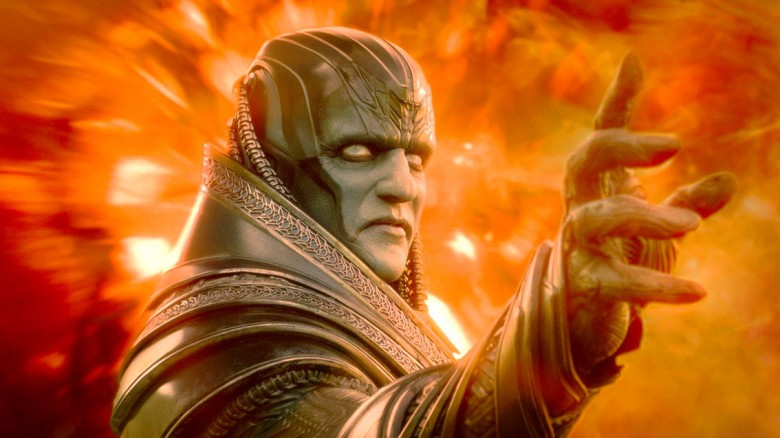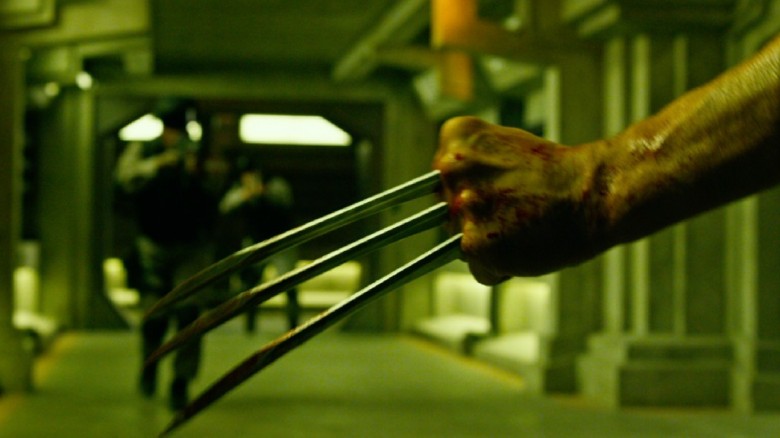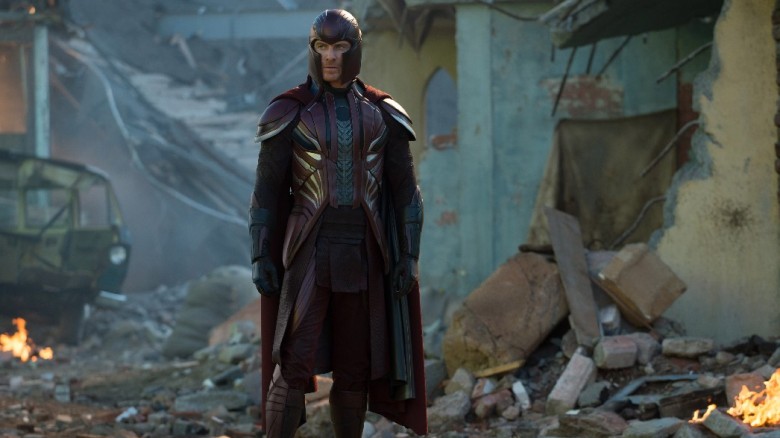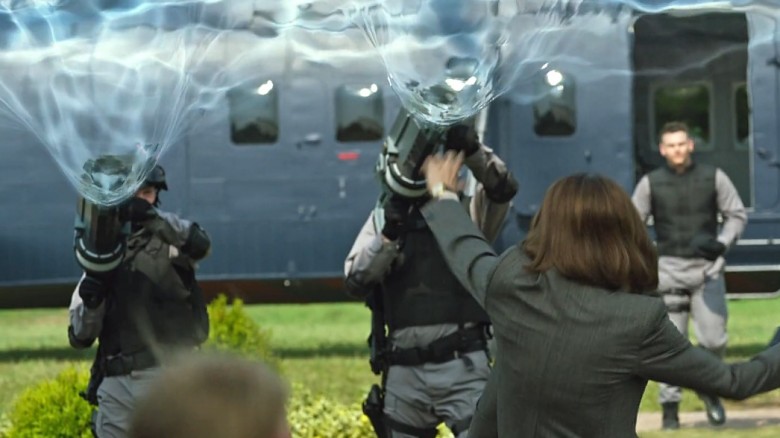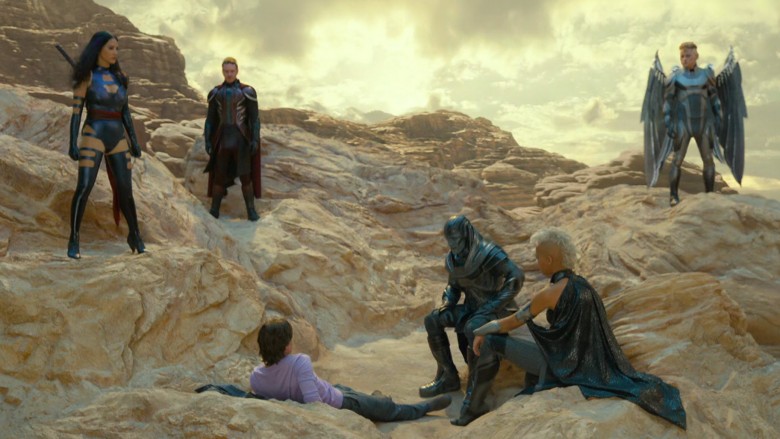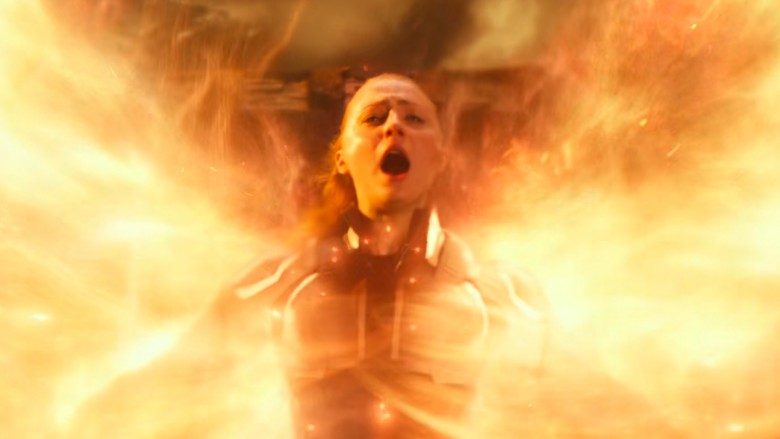Dumb Things In X-Men: Apocalypse Everyone Just Ignored
With Days of Future Past, director Bryan Singer created one of the best X-Men films ever made. With its 1980s-set sequel Apocalypse? Not so much.
Apocalypse pretty much choked on its own ambition, making for a bloated story with far too many characters and even more weird plot holes. Look, we love the X-Men as much as anyone, but this one had its faults.
So, how did Nightcrawler even get captured?
X-Men movies love a good cage fight scene, and in this one, Singer uses the mutant fight club to introduce us to Angel and Nightcrawler. Nightcrawler is dumped into the ring as an unwilling contestant, and somehow can't teleport out of the ring because ... it's electrified? Which makes no sense, because that would mean Nightcrawler can't, like, teleport through a wall with wiring in it. Or a light switch.
That is absurd. Nightcrawler can teleport to pretty much anywhere he can see or has visited before. Hell, why not just teleport into the rafters, then outside the ring?
That doesn't even address the question of how these guys managed to capture Nightcrawler and keep him prisoner. He's a teleporter, and pretty darn nimble, to boot. Not the easiest guy for some street level fight club thugs to grab and lock up.
How does no one recognize Magneto?
After the events of Days of Future Past, Magneto goes on the run and is the most wanted fugitive on the planet (as we are told very through some clunky exposition while young Scott Summers sits in his history class). Even accounting for it being the 1970s and 1980s, there is still television and radio pretty much everywhere. So, how the heck does Magneto manage to spend a decade living incognito working a blue collar job?
Yes, semi-recognizable people can sometimes manage to just blend in, but c'mon — he's literally the most wanted man on the planet, to the point that they teach about him and flash his picture around in public schools. Even overseas, it's silly to think he could hide in plain sight for a decade.
How on Earth does Apocalypse's machine work? Microchips of magic gold?
This is a movie full of insane tech, but Apocalypse's ancient Egypt–era body-swapping machine might be the goofiest.
Thousands of years ago, he managed to build this machine that allows him to swap bodies. It's clearly not his mutant power, because he needs this crazy machine to do it. But, how does it work? And how did he figure out how to build it? With pretty much no technology?
It seems to run like a giant, solar-powered microchip, but with weird, floating gold? Or something? But, how does that gold goo swap a consciousness? And why does it need all the chanting? Is it both solar- and chant-powered? Seriously, the movie just blows right by this.
Why did the pyramid have a built-in self-destruct mechanism?
Apocalypse is all set to body swap into Oscar Isaac back in the day, taking over a body with a Wolverine-level healing factor. But, all hell breaks loose when some of his rogue followers try and take him out during the big ritual. Their sneak attack is to send giant blocks to take out the pillars for the pyramid, and it makes for a crazy, CGI explosion of wackiness as they bust out the supports and collapse the entire pyramid.
It's not uncommon for real-life pyramids to have secret tunnels and passages, but why the heck would Apocalypse have his ultimate super-pyramid built with what is effectively a giant self-destruct button?
Wait, how did they feel that Egyptian earthquake around the world?
When Apocalypse wakes up, it makes for a big ol' earthquake as he rises from the rubble. So big, in fact, that it's literally felt across the entire planet.
This isn't exactly how earthquakes work. At least not earthquakes that don't take out pretty much an entire city.
Egypt doesn't look much worse for the wear after the quake, yet a whole lot of characters in other countries at the time can feel it shake things up. If the quake was that big, it'd be global news — and Egypt would pretty much be wiped off the map.
How does Apocalypse's power work?
We're constantly told Apocalypse has god-like power, and we see a few of those random abilities pop up with pretty much no consistency. We see him kill people with sand and dirt a few times, just pulling it off walls and using it to chop off people's heads. That's a nifty skill, which he never really uses again.
Later on, he uses his mystery powers to upgrade the (seemingly) random mutants he chooses to serve as his horsemen of the apocalypse. Again, why not do more than four? Why not use that skill to build an entire army of souped-up mutants?
He can also teleport anywhere on a whim, which comes in handy. Oh, and then there's his bewilderingly ability to touch a TV and download pretty much all the information in the world. WTF? The movie tries to shrug off this moment, flashing the camera up to some satellites, as though to say: "Satellites! Yeah!" Um, no.
Why did Xavier erase Moira's memory?
We met Moira Taggart way back in X-Men: First Class, and she played a key role in working as an intermediary between the X-Men and the US government. So, wouldn't that connection have come in handy these past few decades? There were also hints of a burgeoning love connection, which was largely abandoned after First Class. And yet Xavier erases Moira's memory, so when they meet her, she thinks it's the first time.
Xavier prides himself on using his powers responsibly, but he erased someone's memories against their will. And then even after bringing her back, Moira doesn't really do much other than provide a bit of exposition.
Everyone still looks super young
This whole prequel saga began in 1962 with First Class, and we've jumped all the way to 1983 in Apocalypse. And yet everyone looks like they're pretty much in their late twenties or early thirties — when they should be in their forties and (in some cases) fifties.
They poke a bit of fun at this, saying Moira still looks young, but c'mon. They all still look far too young for their presumed ages in this movie. Hank McCoy should be at least in his forties now. Dude still looks about 25.
In the original X-Men trilogy, Xavier was already a youngish-looking Patrick Stewart when he met Jean as a child (in that continuity). This is obviously an issue when you keep the same cast over the span of about five years and move the series through three decades. But, just try a little bit, guys.
So, what was Apocalypse's plan?
There are clichéd bad guys who just want to rule the world, and then there's Apocalypse. We see him rule in ancient Egypt, and we're told he's ruled different civilizations throughout history, though something terrible usually happens to those civilizations. So, does he just want to rule the world? Or destroy it?
He gets rid of all the nukes to, umm, save humans from themselves? Then he wants Xavier's powers so he can mind-control everybody, maybe? He kills a boatload of people with his matter manipulation, so if he wants to rule the world, he's not leaving a hell of a lot of people to rule. If anything, all he really accomplishes is making a whole bunch of giant garbage tornadoes.
How did Logan end up at Project X?
The entire crux of Days of Future Past was that they've altered the timeline (mostly to just avoid the awfulness that was X-3: The Last Stand, we can only presume) and set course for a better future. Wolverine's story even gets a cool twist when he's fished out of the river, and it seems Stryker will be taking him off to Project X—but wait! That's Mystique wearing a Stryker face, which seemed to imply that Wolverine might be able to avoid his fate of being captured by Weapon X and experimented on.
Yet, when the young X-Men bust into Alkali Lake, they find a feral Wolverine (complete with his old school headgear from the comics) right where he would've been in the original timeline. So, what was the point of that final wink from Mystique in Days of Future Past?
For what it's worth, the screenwriters have hedged that time wants to correct itself, so it stands to reason Wolverine would find his way to Weapon X. But what was the entire point of Days of Future Past, then?
So, Magneto just goes along with Apocalypse?
Poor Magneto. The guy is a walking Greek tragedy, and just when it seems like he's carved out a happy little life with a wife and child, he's spotted when he uses his powers to save a man's life. That leads the local cops (why they think it's a good idea to confront him is anyone's guess) to pull him into a contrived little trap where his wife and child are both accidentally killed by a stray arrow (told you: Greek tragedy). This pisses him off, and he takes out all the cops. Then Apocalypse busts out of a portal and says, "C'mon, bro." And Magneto just heads off with him and joins up to literally cause the end of the world.
That's ... a pretty big leap. Magneto has spent pretty much every X-Men movie fighting for mutant rights, and now he just wants to help this big blue dude kill millions and take over the world? There's grief-stricken, and there's just wildly out of character.
Making matters worse, all it takes is tiny bit of cajoling from his old friends to make him change right back again?
Stryker has a gun to disable all mutants?
When Stryker busts into the charred wreckage that was Xavier's school, he brings a small strike team armed with big, goofy-looking guns. These somehow have the ability to knock out and disable dozens upon dozens of mutants at once.
That would've come in handy, like, all the time, right? Like, when Wolverine gets loose and goes rogue? Shoot him with that thing. Plus, if this was invented in the 1980s, why didn't we see tech like this in the original three (modern-day) X-Men movies? Or, why doesn't anyone take out Apocalypse and his goons with it?
Why does Apocalypse need anyone?
As for Apocalypse's horsemen, why does he need them? Apocalypse pretty much has god-like power, so why waste your time pimping out a posse? Without all these machinations, he could just use his matter manipulation to do whatever he wants. No recruitment drive required.
Is he just lonely?
Wait, so Jean can just go Phoenix now?
Early on, the film hints that Jean has some great power locked away inside, but it never goes beyond shaking a room and being weird. So, to make the leap from that, to an ultimate power that is capable of shutting down a god in under a minute, is one heck of a curveball.
Now, comic fans are certainly well aware that Jean tapped into the Phoenix force in that moment, but this movie never really did much of the heavy lifting required to set that up — especially since it turns out to be the deus ex machina that saves the entire world.
The only person not all that surprised is Apocalypse. Just as he's getting Phoenix-fried, Apocalypse utters, "All is revealed," which implies he's encountered the Phoenix force at some point in the past. That makes sense. He's been around a while, and it's a cosmic force. He might know what it is — but that doesn't mean the average moviegoer does.

